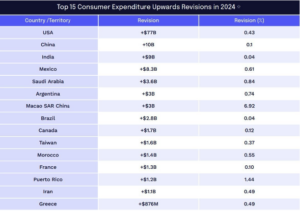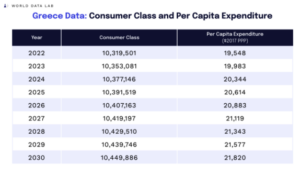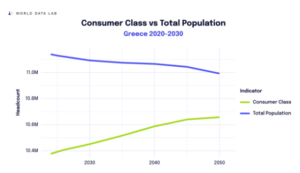On the map of the Austrian research centre World Data Lab, with the latest forecasts for the evolution of the “consumer class”, most of the European Union is in red.
This means that the forecasts for the rise of the consumer class have been revised downwards as a consequence of factors such as the demographic crisis, weak economic growth and the brain drain.
The major exception is Greece, where forecasts have been revised upwards. In fact, Greece was among the 15 countries with the highest forecast for the expansion of the consumer class worldwide.

Explosion of consumer spending in Greece
Members of the consumer class are those citizens who spend $12 or more per day.
The Greek consumer class will grow by 24,000 people in 2024 and by 14,000 in 2025, reaching a total of 10.4 million people, according to World Data Lab’s projections.
The average Greek consumer is expected to spend €20,344 this year (up from €19,548 in 2022) and reach €21,820 in 2030.
Total consumer spending in Greece will increase by €8.8 billion in 2024 and by €6.6 billion in 2025.

Consumer expansion despite population shrinkage
But how is consumer growth and spending in Greece being achieved while the country is plagued by declining birth rates and a shrinking population?
“Despite the demographic challenges, the upgrade to 2% (from 1.5%) of the forecast for consumer spending growth in Greece in 2024 reflects five factors,” explained World Data Lab head Wolfgang Fengler to newmoney:
“First, the projected decline in the working-age population could easily be offset by the activation of people who are not currently working, particularly by women over 40.

Second, economic recovery and income convergence: the economy rising to pre-pandemic trend levels thanks to the cyclical recovery in tourism demand – which amounted to 18% of total GDP in 2022 in Greece – and the resumption of structural reforms and investment.
Third, the improved economic outlook. Strong growth and high inflation are helping to reduce the public debt-to-GDP ratio to below its pre-pandemic level.
Fourth, growth-friendly fiscal consolidation and targeted support to vulnerable households are expected to sustain growth and boost consumer confidence and spending.
Fifth, Greece has undertaken substantial reforms. As a reflection of the country’s economic dynamism, Greece has been recognised as ‘Country of the Year’ by the Economist for 2023.”
Greece: Europe’s positive exception
At the same time, many developed economies are expected to see consumer spending decline.
Among them, Japan stands out: the country is predicted to lose 3.6 million consumers over the next seven years.
Other shrinking consumer markets include Italy, Portugal, Germany and Bulgaria.
Ask me anything
Explore related questions





